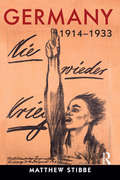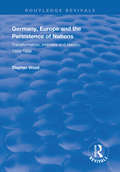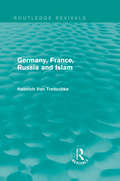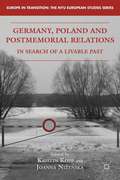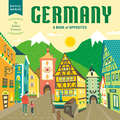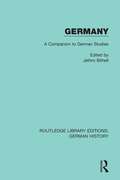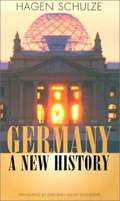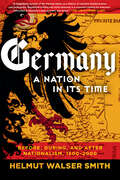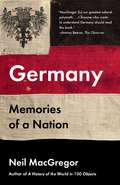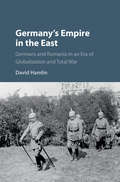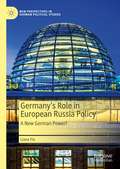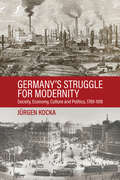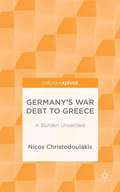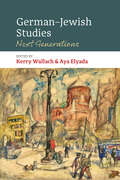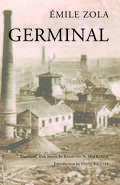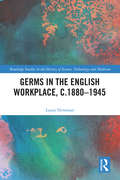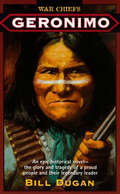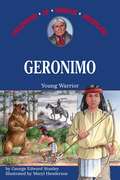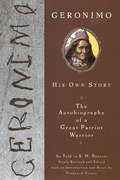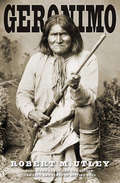- Table View
- List View
Germany, 1914-1933: Politics, Society and Culture
by Matthew StibbeGermany, 1914-1933: Politics, Society and Culture takes a fresh and critical look at a crucial period in German history. Rather than starting with the traditional date of 1918, the book begins with the outbreak of the First World War in 1914, and argues that this was a pivotal turning point in shaping the future successes and failures of the Weimar Republic. Combining traditional political narrative with new insights provided by social and cultural history, the book reconsiders such key questions as: How widespread was support for the war in Germany between 1914 and 1918? How was the war viewed both ‘from above’, by leading generals, admirals and statesmen, and ‘from below’, by ordinary soldiers and civilians? What were the chief political, social, economic and cultural consequences of the war? In particular, did it result in a brutalisation of German society after 1918? How modern were German attitudes towards work, family, sex and leisure during the 1920s? What accounts for the extraordinary richness and experimentalism of this period? The book also provides a thorough and comprehensive discussion of the difficulties faced by the Weimar Republic in capturing the hearts and minds of the German people in the 1920s, and of the causes of its final demise in the early 1930s.
Germany, Europe and the Persistence of Nations: Transformation, Interests and Identity, 1989-1996 (Routledge Revivals)
by Stephen WoodPublished in 1998, this book is an articulate and densely documented account of political, cultural and historical forces and tensions involved in contemporary European integration; most especially concerning Germany. In doing so it provides an effective fusion of a vast array of material from what are normally separate disciplines. The book investigates contemporary resonances of identifications and conceptions of political boundaries that appeared in Europe in the late eighteenth and nineteenth century. It argues that within a ‘supranationalising’ Europe, national identity and nationalism have not disappeared as cultural and political phenomena. Rather they persist and manifest themselves in variable forms at popular and elite levels. This is the basis for Europe’s condition of far from completed unity, at the centre of which is now a reunited Germany, more sure of itself but less sure of the world around it.
Germany, France and Postwar Democratic Capitalism: Expert Rule (Routledge Studies in Modern European History)
by François GodardThis book concentrates on the political economies of Germany and France in the period spanning between the end of the Second World War and the 1970s, with a subsequent consideration of Italy and Britain as ‘shadow cases’.European postwar accounts have never reconciled the thwarting of widespread aspirations to socialism, and the twin feat of equalitarian growth and institutional stability. This success is precisely due to achieving the reconciliation of democracy and economic management, the yearning for collective control over social and material outcomes that was tragically aborted in the interwar period, and fed 1945 expectations. Germany, in 1948–49, and France, in 1958, carried radical institutional and policy reforms with much more in common than previously realised. Under the recast republics, social groups were steered towards support for modernisation – by the state, not through a mythical settlement. Consensus was built for trade and low inflation as vectors for higher productivity. State capacity was lifted by leadership in ideas, executive branch accountability to voters, and technocratic agencies. British and Italian underperformances reveal the countries’ uneasiness with the compact.Once understood, the convergence of productivism and democracy in the European regulatory state provides a new narrative – especially relevant today – of experts taming populists.
Germany, France, Russia and Islam (Routledge Revivals)
by Heinrich Von TreitschkeHeinrich Von Treitschke was a prolific German historian and political writer during the nineteenth century. In Germany, France, Russia and Islam, first published in 1915, he considers European diplomatic relations from the patriotic perspective of imperial Germany, in particular examining Germany’s relationship to Turkey and France. This is a fascinating classic work, which will be of great value to academics and students interested in nineteenth-century European politics and history.
Germany, Poland, and Postmemorial Relations
by Kristin Kopp Joanna NiżyńskaCovering the period following the collapse of communism, the unification of Germany, and Poland's accession to the EU, this collection focuses on the interdependencies of German, Polish, and Jewish collective memories and their dialogic, transnational character, showing the collective nature of postmemory and the pressures that shape it.
Germany: A Book of Opposites (Hello, World)
by Ashley EvansonHello, Germany! This board book series pairs early learning concepts with colorful, stylish illustrations of the iconic art, architecture, food, and culture of places around the world. Both children and adults are sure to love these hip and charming books!In Germany, you can use words that are opposites to help you discover the country: hikers at the top and the bottom of the Alps, beautiful Black Forest trees that are near and far, and delicious Bavarian treats that are eaten and then gone.
Germany: A Companion to German Studies (Routledge Library Editions: German History #5)
by Jethro BithellThe 5th edition of this classic book was originally published in 1955, and includes contributions from well-known authors on history, politics, literature, art, architecture and philosophy. The ideas are discussed and interpreted in the context of the development of European and global intellectual, cultural and political life and includes chapters on the German communist writers of the post-war years.
Germany: A New History
by Deborah Lucas Schneider Hagen SchulzeThis book conveys the full sweep of German history, from the days of the Romans to the fall of the Berlin Wall.
Germany: Before, During, And After Nationalism, 1500-2000
by Helmut Walser SmithThe first major history of Germany in a generation, a work that presents a five-hundred-year narrative that challenges our traditional perceptions of Germany’s conflicted past. For nearly a century, historians have depicted Germany as a rabidly nationalist land, born in a sea of aggression. Not so, says Helmut Walser Smith, who, in this groundbreaking 500-year history—the first comprehensive volume to go well beyond World War II—challenges traditional perceptions of Germany’s conflicted past, revealing a nation far more thematically complicated than twentieth-century historians have imagined. Smith’s dramatic narrative begins with the earliest glimmers of a nation in the 1500s, when visionary mapmakers and adventuresome travelers struggled to delineate and define this embryonic nation. Contrary to widespread perception, the people who first described Germany were pacific in temperament, and the pernicious ideology of German nationalism would only enter into the nation’s history centuries later. Tracing the significant tension between the idea of the nation and the ideology of its nationalism, Smith shows a nation constantly reinventing itself and explains how radical nationalism ultimately turned Germany into a genocidal nation. Smith’s aim, then, is nothing less than to redefine our understanding of Germany: Is it essentially a bellicose nation that murdered over six million people? Or a pacific, twenty-first-century model of tolerant democracy? And was it inevitable that the land that produced Goethe and Schiller, Heinrich Heine and Käthe Kollwitz, would also carry out genocide on an unprecedented scale? Combining poignant prose with an historian’s rigor, Smith recreates the national euphoria that accompanied the beginning of World War I, followed by the existential despair caused by Germany’s shattering defeat. This psychic devastation would simultaneously produce both the modernist glories of the Bauhaus and the meteoric rise of the Nazi party. Nowhere is Smith’s mastery on greater display than in his chapter on the Holocaust, which looks at the killing not only through the tragedies of Western Europe but, significantly, also through the lens of the rural hamlets and ghettos of Poland and Eastern Europe, where more than 80% of all the Jews murdered originated. He thus broadens the extent of culpability well beyond the high echelons of Hitler’s circle all the way to the local level. Throughout its pages, Germany also examines the indispensable yet overlooked role played by German women throughout the nation’s history, highlighting great artists and revolutionaries, and the horrific, rarely acknowledged violence that war wrought on women. Richly illustrated, with original maps created by the author, Germany: A Nation in Its Time is a sweeping account that does nothing less than redefine our understanding of Germany for the twenty-first century.
Germany: Memories of a Nation
by Neil MacgregorFor the past 140 years, Germany has been the central power in continental europe. Twenty-five years ago a new German state came into being. How much do we really understand this new Germany, and how do its people understand themselves?Neil MacGregor argues that, uniquely for any European country, no coherent, overarching narrative of Germany's history can be constructed, for in Germany both geography and history have always been unstable. Its frontiers have constantly shifted. Königsberg, home to the greatest German philosopher, Immanuel Kant, is now Kaliningrad, Russia; Strasbourg, in whose cathedral Wolfgang von Geothe, Germany's greatest writer, discovered the distinctiveness of his country's art and history, now lies within the borders of France. For most of the five hundred years covered by this book Germany has been composed of many separate political units, each with a distinct history. And any comfortable national story Germans might have told themselves before 1914 was destroyed by the events of the following thirty years.German history may be inherently fragmented, but it contains a large number of widely shared memories, awarenesses, and experiences; examining some of these is the purpose of this book. MacGregor chooses objects and ideas, people and places that still resonate in the new Germany--porcelain from Dresden and rubble from its ruins, Bauhaus design and the German sausage, the crown of Charlemagne and the gates of Buchenwald--to show us something of its collective imagination. There has never been a book about Germany quite like it.From the Hardcover edition.
Germany’s Empire in the East: Germans and Romania in an Era of Globalization and Total War
by David HamlinThis book puts German policy toward Romania and the German East into a global context. One of the signal events of the twentieth century was Germany's effort to construct an empire in Europe modeled on the European experience outside Europe. The turn to European empire resulted less from the dynamics of capitalist expansion than from a deep crisis in global political and economic order. Confronted with the global economic and political power of the western allies, the Germans turned to Eastern Europe to construct a dependent space, tied to Germany as Central America was to the US. The First World War transformed how Germans thought about international order, empire and the nature of Romanians. The domestic consequences of Germany's eviction from global markets authorized deep interventions in Romanian society to establish a pre-eminent position for the German state inside Romania. David Hamlin embeds occupation and war aims in economic concerns.
Germany’s Role in European Russia Policy: A New German Power? (New Perspectives in German Political Studies)
by Liana FixThis book contributes to the debate about a new German power in Europe with an analysis of Germany’s role in European Russia policy. It provides an up-to-date account of Germany’s “Ostpolitik” and how Germany has influenced EU-Russia relations since the Eastern enlargement in 2004 - partly along, partly against the interests and preferences of new member states. The volume combines a rich empirical analysis of Russia policy with a theory-based perspective on Germany’s power and influence in the EU. The findings demonstrate that despite Germany’s central role, exercising power within the EU is dependent on legitimacy and acceptance by other member states.
Germany’s Struggle for Modernity: Society, Economy, Culture, and Politics, 1780-1918
by Jürgen Kocka Volker BerghahnIn the historiography of modern Germany, the nineteenth century’s innovations marks a period of seismic change. From accelerating demographic growth to growing secularization and the rise of nationalism, it was a century which laid the foundations for both a civil society and the dictatorships of the twentieth century. In this comprehensive history of Germany from 1780 to 1918, Jürgen Kocka re-examines the transformative interactions that took place between society, economy, culture, and politics. Innovatively resituating these developments within a wider context of conflict and transformation in Europe, this book illuminates new ways to understand the emergence of classical modernity within the nineteenth century.
Germany’s War Debt to Greece: A Burden Unsettled
by Nicos ChristodoulakisThe book chronicles the Occupation Loan that was forcibly obtained by the Third Reich from the Greece in 1942-1944 and demonstrates why Greece's claim for the repayment of the loan is still valid. To overcome the absence of a normal debt agreement between the two countries, various assessments of its current value are presented and discussed.
German–Jewish Studies: Next Generations
by Aya Elyada Kerry WallachAs a field, German-Jewish Studies emphasizes the dangers of nationalism, monoculturalism, and ethnocentrism, while making room for multilingual and transnational perspectives with questions surrounding migration, refugees, exile, and precarity. Focussing on the relevance and utility of the field for the twenty-first century, German-Jewish Studies explores why studying and applying German-Jewish history and culture must evolve and be given further attention today. The volume brings together an interdisciplinary range of scholars to reconsider the history of antisemitism—as well as intersections of antisemitism with racism and colonialism—and how connections to German Jews shed light on the continuities, ruptures, anxieties, and possible futures of German-speaking Jews and their legacies.
Germinal
by Emile Zola David Baguley Raymond N. MackenzieCoal mines have become rare, but the miners of Germinal are immortal. This new edition of the novel, with a translation by Raymond MacKenzie, is an exquisite tribute to their work, their misery and their eventual revolt. In his introduction, David Baguley--one of the most respected authorities on the work of Zola--brilliantly illuminates the genetic, historical and aesthetic aspects of the novel. His lucid, sensitive and critical gaze highlights the real secrets of the work: its underlying anthropological and social investigation, the dark power of the tragic imagination and the brightness of symbolic and mythic intuitions. --Henri Mitterand, Professor Emeritus, Columbia University
Germs
by Judith Miller Stephen Engelberg William J BroadIn the wake of the anthrax letters following the attacks on the World Trade Center, Americans have begun to grapple with two difficult truths: that there is no terrorist threat more horrifying -- and less understood -- than germ warfare, and that it would take very little to mount a devastating attack on American soil. In Germs, three veteran reporters draw on top sources inside and outside the U.S. government to lay bare Washington's secret strategies for combating this deadly threat. Featuring an inside look at how germ warfare has been waged throughout history and what form its future might take (and in whose hands), Germs reads like a gripping detective story told by fascinating key figures: American and Soviet medical specialists who once made germ weapons but now fight their spread, FBI agents who track Islamic radicals, the Iraqis who built Saddam Hussein's secret arsenal, spies who travel the world collecting lethal microbes, and scientists who see ominous developments on the horizon. With clear scientific explanations and harrowing insights, Germs is a masterfully written -- and timely -- work of investigative journalism.
Germs in the English Workplace, c.1880–1945 (Routledge Studies in the History of Science, Technology and Medicine #44)
by Laura NewmanThis book looks at how the workplace was transformed through a greater awareness of the roles that germs played in English working lives from c.1880 to 1945. Cutting across a diverse array of occupational settings – such as the domestic kitchen, the milking shed, the factory, and the Post Office – it offers new perspectives on the history of the germ sciences. It brings to light the ways in which germ scientists sought to transform English working lives through new types of technical and educational interventions that sought to both eradicate and instrumentalise germs. It then asks how we can measure and judge the success of such interventions by tracing how workers responded to the potential applications of the germ sciences through their participation in friendly societies, trade unions, colleges, and volunteer organisations. Throughout the book, close attention is paid to reconstructing vernacular traditions of working with invisible life in order to better understand both the successes and failures of the germ sciences to transform the working practices and material conditions of different workplaces. The result is a more diverse history of the peoples, politics, and practices that went into shaping the germ sciences in late nineteenth- and early twentieth-century England.
Germs: Biological Weapons and America's Secret War
by Judith Miller William Broad Stephen EngelbergAnalysis of the role of germs and biological weaponry in future wars.
Germs: Biological Weapons and America's Secret War
by Judith Miller Stephen Engelberg William J BroadIn the wake of the anthrax letters following the attacks on the World Trade Center, Americans have begun to grapple with two difficult truths: that there is no terrorist threat more horrifying -- and less understood -- than germ warfare, and that it would take very little to mount a devastating attack on American soil. In Germs, three veteran reporters draw on top sources inside and outside the U.S. government to lay bare Washington's secret strategies for combating this deadly threat. Featuring an inside look at how germ warfare has been waged throughout history and what form its future might take (and in whose hands), Germs reads like a gripping detective story told by fascinating key figures: American and Soviet medical specialists who once made germ weapons but now fight their spread, FBI agents who track Islamic radicals, the Iraqis who built Saddam Hussein's secret arsenal, spies who travel the world collecting lethal microbes, and scientists who see ominous developments on the horizon. With clear scientific explanations and harrowing insights, Germs is a masterfully written -- and timely -- work of investigative journalism.
Geronimo
by Bill DuganThe Apache Wars The blood of Geronimo's people is being brutally spilled by white invaders. Now, the proud Chiricahua Apache war chief prepares for the greatest and most desperate conflict of all--the final battle against the cruel might of the U.S. Army, which seeks nothing short of total extermination of the Apache. The government has dispatched the brilliant General George Crook, an army leader as strong and relentless as the Apache warrior himself. Locked together throughout the blistering Apache Wars, the cunning great chief and the complex white soldier will shape American history and seal forever the fate of the Apache nation. Impeccably researched, rich with real-life characters and period detail, this powerful historical novel vividly recounts the fury of the Apache Wars and their inimitable leader, Geronimo, from his first battle to his final, tragic betrayal and death. Leader of Power Geronimo knew how many white men wanted all Apaches--men, women, and children--dead. The White Eyes' newspapers were full of such talk. Orders had been given to exterminate them, sell the children into slavery in Mexico, whatever it took to assure that not one Apache still drew breath in Arizona or New Mexico. Geronimo would not have believed it, but one who knew English showed him the words in the newspaper. There was only one way to make sure that it didn't happen, and that was to strike first and to keep on striking until all the White Eyes were dead or had run for their lives. The mountains and deserts belonged to his people. The Mexicans hadn't been able to take them away, and the Americans were going to fall just as hard. If blood had to be spilled until there was no one left to bleed, that is how it would have to be. That was why he had decided to leave the reservation. Now that he was out, he intended to stay out, until he had won or until he could breathe no more.
Geronimo
by Meryl Henderson George E. StanleyIn this illustrated biography, young Apache Goyahkla and his friend play games in their village that will prepare him for his role as a hunter and warrior--and the place he will hold in history as Geronimo, fighter for the rights of his people.
Geronimo
by GeronimoEnter the world of Geronimo Stilton, where another funny adventure is always right around the corner. Each book is a fast-paced adventure with lively art and a unique format kids 7-10 will love. Ah, there's nothing like a relaxing vacation on the beach! I would spread out by the crystal-clear water with a good book. What more could a mouse want? At least, that was the plan. But somehow, my vacations never seem to go according to plan. Instead of a beautiful seaside resort, I found myself in a fleabag hotel that was falling down around my ears! Oh, would I ever be able to relax and enjoy my vacation??
Geronimo (The Lamar Series in Western History)
by Robert M. UtleyThis &“meticulous and finely researched&” biography tracks the Apache raider&’s life from infamous renegade to permanent prisoner of war (Publishers Weekly). Notorious for his ferocity in battle and uncanny ability to elude capture, the Apache fighter Geronimo became a legend in his own time and remains an iconic figure of the nineteenth century American West. In Geronimo, renowned historian Robert M. Utley digs beneath the myths and rumors to produce an authentic and thoroughly researched portrait of the man whose unique talents and human shortcomings swept him into the fierce storms of history. Utley draws on an array of newly available sources, including firsthand accounts and military reports, as well as his geographical expertise and deep knowledge of the conflicts between whites and Native Americans. This highly accurate and vivid narrative unfolds through the alternating perspectives of whites and Apaches, arriving at a more nuanced understanding of Geronimo&’s character and motivation than ever before. What was it like to be an Apache fighter-in-training? Why was Geronimo feared by whites and Apaches alike? Why did he finally surrender after remaining free for so long? The answers to these and many other questions fill the pages of this authoritative volume.
